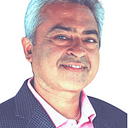Curricula Vitae for the Quantum Computation Field
Recently a couple of people have commented that like a suddenly appearing quantum particle, I seem to have come into the quantum computing field from nowhere.
It is true that I have never trained as a quantum physicist and that in the last few decades, I have never built a computer — beyond the days of studying to be a computer engineer (BSE in Computer Engineering, Case Institute of Technology, CWRU). But I could have answered tongue-in-cheek in keeping with the current conceptions of quantum physics: “Yes, I have entangled with the knowledge of Schrodinger, Bohr, and Einstein.” Or, “This knowledge which is all superposed incarnates whenever I begin to measure the possibilities of what is possible with quantum computation.” Or, “ I am a part of the universal wave-function and since all that possibility belongs to this wave it is part of me.” Or, as elaborated in the clever movie Everything Everywhere All at Once, “I merged with the quantum physicist version of myself in some other world created as an outcome of statistical inevitability.”
Instead, I want to briefly elaborate on the practical path I have taken.
Essentially it has been through systems thinking. I grappled with the nature of reality by immersing myself in mystical poetry and self-directed multi-disciplinary study and arrived at a unique way to perceive systems. This thinking was encapsulated in a three-volume series on fractals that culminated in the book “The Fractal Organization” (which on a happy side note also recently got included in a Forbes Executive Library).
I arrived at the conception of the fractal bases of systems, regardless of scale, by observation of progress in different types of organizations — ranging from teams to economies and nations, and different types of fields — ranging from physics to economics.
Shortly after finishing this decade-long work I had an unexpected and fortuitous opening to mathematics and was seized by a desire to express this fractal framework using mathematics. This led to my doing a Ph.D. from the University of Pretoria, South Africa (dissertation focus: mathematics of innovation in complex adaptive systems) and as I got close to finishing this a Professor in the South African university system wisely said to me, “the day you get your Ph.D. will be the first day of the rest of your life.” This could not have been more true.
In the course of the Ph.D. I glimpsed that the mathematically-infused fractal framework provided insight into the structure of organization even at a smaller scale — molecular plans in cells, atoms in the periodic table, quantum particles — and this became the basis of subsequent work summarized as a ten-volume book series on Cosmology of Light and numerous IEEE technical articles.
This insight — viewing layers of matter and life (a.k.a. quantum particles, atoms, molecular plans in cells) as one single system that are all fractal expressions of root patterns that must also exist at the quantum level — quite simply is the unique point of view central to my conception of quantum computation (I recently delivered an exclusive Forbes event focused on this).
So while it appears like I have come out of nowhere, in fact, there has been an active decades-long grappling with the nature of reality that in my case also resulted in points of view on quantum computation.
In general, given that no single point of view — regardless of how many physicists subscribe to it — can claim to have grasped the nature of reality, for us to get anywhere in the quantum computational field that by definition deals with the mysterious at the border of invisibility and therefore has to do with the nature of reality, will similarly require diverse curricula vitae.
The success of quantum computation depends on this.
